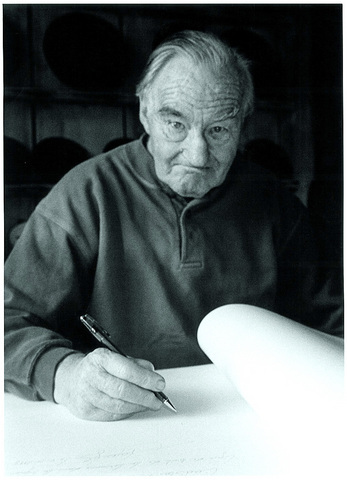The founder of Amnesty International, Peter Benenson, has died at the age of 84. Amnesty has become one of the world's most important human rights organizations, created in the wake of an article Benenson wrote in the London-based Observer newspaper in 1961.
Benenson, an Eton-educated London lawyer, penned the opinion piece after being outraged by the arrest and imprisonment of two students who had drunk a toast to liberty in a Lisbon cafe.

PHOTO: AFP
"Open your newspaper any day of the week and you will find a report from somewhere in the world of someone being imprisoned, tortured or executed because his opinions or religion are unacceptable to his government. The newspaper reader feels a sickening sense of impotence. Yet if these feelings of disgust all over the world could be united into common action, something effective could be done."
These sentiments struck a chord with the British public, and a few years later Amnesty International was created. From South Africa and Chile to China and Iraq, Amnesty has since helped highlight the abuse of prisoners. The organization coined the term "prisoners of conscience" while its logo, a candle surrounded by barbed wire, became a symbol of hope and freedom. In 1977 the organization won the Nobel Peace Prize for "its tireless fight for justice round the world," as the award committee put it.
"When I first lit the Amnesty candle, I had in mind the old Chinese proverb: Better light a candle than curse the darkness," Benenson explained.
Born in July 1921, the grandson of a Russian Jewish banker, Benenson revealed a flair for controversy at an early age. When 16 he launched his first campaign, to get school support during the Spanish Civil War for a relief committee which was helping Republican war orphans.
Irene Khan, secretary-general of Amnesty, said Benenson's vision gave birth to human rights activism.
"His life was a courageous testament to his visionary commitment to fight injustice around the world. He brought light into the darkness of prisons, the horror of torture chambers and tragedy of death camps," Khan said.
Benenson's family said he had been ill for some time and he died on Friday evening.
John Jackson, director of Burma Campaign, said: "Peter showed us that something as simple as a letter can save lives, and that's a strategy we still use. He demonstrated the power of the pen. It shows that the world is watching."

A Chinese scientist was arrested while arriving in the US at Detroit airport, the second case in days involving the alleged smuggling of biological material, authorities said on Monday. The scientist is accused of shipping biological material months ago to staff at a laboratory at the University of Michigan. The FBI, in a court filing, described it as material related to certain worms and requires a government permit. “The guidelines for importing biological materials into the US for research purposes are stringent, but clear, and actions like this undermine the legitimate work of other visiting scholars,” said John Nowak, who leads field

Swedish campaigner Greta Thunberg was deported from Israel yesterday, the Israeli Ministry of Foreign Affairs said, the day after the Israeli navy prevented her and a group of fellow pro-Palestinian activists from sailing to Gaza. Thunberg, 22, was put on a flight to France, the ministry said, adding that she would travel on to Sweden from there. Three other people who had been aboard the charity vessel also agreed to immediate repatriation. Eight other crew members are contesting their deportation order, Israeli rights group Adalah, which advised them, said in a statement. They are being held at a detention center ahead of a

‘THE RED LINE’: Colombian President Gustavo Petro promised a thorough probe into the attack on the senator, who had announced his presidential bid in March Colombian Senator Miguel Uribe Turbay, a possible candidate in the country’s presidential election next year, was shot and wounded at a campaign rally in Bogota on Saturday, authorities said. His conservative Democratic Center party released a statement calling it “an unacceptable act of violence.” The attack took place in a park in the Fontibon neighborhood when armed assailants shot him from behind, said the right-wing Democratic Center, which was the party of former Colombian president Alvaro Uribe. The men are not related. Images circulating on social media showed Uribe Turbay, 39, covered in blood being held by several people. The Santa Fe Foundation

NUCLEAR WARNING: Elites are carelessly fomenting fear and tensions between nuclear powers, perhaps because they have access to shelters, Tulsi Gabbard said After a trip to Hiroshima, US Director of National Intelligence Tulsi Gabbard on Tuesday warned that “warmongers” were pushing the world to the brink of nuclear war. Gabbard did not specify her concerns. Gabbard posted on social media a video of grisly footage from the world’s first nuclear attack and of her staring reflectively at the Hiroshima Peace Memorial. On Aug. 6, 1945, the US obliterated Hiroshima, killing 140,000 people in the explosion and by the end of the year from the uranium bomb’s effects. Three days later, a US plane dropped a plutonium bomb on Nagasaki, leaving abut 74,000 people dead by the